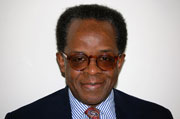
How low will the GOP go?
By Lee A. Daniels, NNPA Columnist
Karl Marx famously wrote, “History repeats itself, first time as tragedy, second as farce.”
So, his ghost must have eagerly joined the many living in this dimension who last week thoroughly enjoyed the two spectacles that underscore the chaos within – and perhaps even the coming-apart of – the Republican Party.
One was Donald Trump’s playing the same racist trick on Jeb Bush that three decades ago Jeb’s dad, George H.W. Bush, used to grievously damage the 1988 presidential candidacy of his Democratic opponent, Massachusetts Gov. Michael Dukakis, and capture the White House.
That’s the “soft-on-a-”colored”-criminal gambit.
During the 1988 campaign, the elder Bush released an ad blaming Dukakis for the rape of a White woman committed by the convict Willie Horton, an African-American, while he was out of prison on a state-sponsored furlough program Dukakis had supported.
On Aug. 31, Trump posted a video implying that Jeb Bush’s past statements of compassion for undocumented immigrant families translated to support for allowing undocumented immigrant criminals to remain in the U.S.
The Trump video showed photos of three Latino men who were charged with murder this year. Two are awaiting trial; one was convicted and given a 50-year sentence. The video ends with the bannered words: “It’s time to get tough!”
Jeb Bush’s response that day was a statement touting his “eight-year record of cracking down on violent criminals” as Florida’s governor and blasting Trump for his past support of “liberal politicians” and proposing an unconstitutional and unworkable scheme to deport all of the nation’s 11-12 million undocumented immigrants.
But, as usual since Trump barged into the GOP’s presidential-primary sweepstakes, the former Florida governor’s response seemed to garner almost no traction. Instead, a comment veteran GOP operative Steve Schmidt made to the online publication Politico the very day Trump’s ad and Bush’s response appeared succinctly identified the devastating predicament of both Bush and the GOP as a whole.
“Jeb Bush left office in 2006 as indisputably the most conservative governor in the U.S.,” said Schmidt, who had managed John McCain’s 2008 presidential campaign. “That was a moment in time when conservatism was defined by the positions you held and the actions you took.”
Now, he went on to say, Trump has shown that “For huge sections of the [conservative] electorate, the definition of who is a conservative is based on who’s making the most incendiary comments. What Trump is conveying in every speech he makes is strength. If you respond to someone who is attacking your character by talking about issues, you’re in the wrong type of fight.”
In other words, Trump’s supporters especially have taken to heart the behavior of the GOP leadership itself during President Obama’s tenure: distort the issues or ignore them altogether in favor of the personal insult and the outrageously irrational beliefs.
Just as the GOP has ignored the American political tradition of being the “responsible opposition” to the party that occupies the White House, Trump’s supporters show little or no interest in the GOP’s façade of “philosophical conservatism” or its time-honored traditions of choosing a nominee. They just want someone who promises the “strength” – read: bigotry and callousness – to “take our country back” to a time when (they like to believe) White conservative rule was unchallenged.
The “trick bag” that reality has put the GOP in led to the week’s second spectacle. On Sept. 3, Reince Priebus, chair of the Republican National Committee, journeyed to Trump’s gaudy business headquarters in Manhattan to sign, in effect, the GOP’s articles of surrender to Trump’s insurgent campaign.
True, technically speaking, the document Trump signed was his pledge to not mount a third-party campaign for the presidency. But all the optics of the event told the real story. No other contender was personally visited by Priebus; and when, after the private signing in Trump’s office, Trump held a, in the words of the New York Times news article, “deeply theatrical and meandering press conference,” Priebus was nowhere in sight – as if he were a mere underling unworthy to share the spotlight with the GOP’s new boss.
Even before last week, several conservative pundits had been wearing their gloom on their sleeves about Trump’s effect on the party and warning the GOP itself was close to disintegration. Now that Trump is in the driver’s seat, with supporters who, as Steve Schmidt said, favor those “making the most incendiary comments,” the question that must be considered is this: How low-down will the Republican Party primary campaign get and how will that affect the 2016 general election campaign for the presidency itself?
